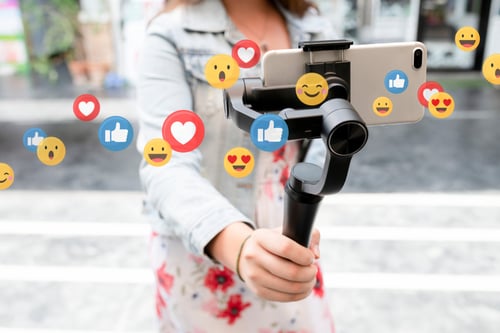What is a brand? Simply put, brands are perceptions or reputations—the way other people see you or your organization. Because people make judgments and decisions based on what they know or don’t know, you need to give yourselves every opportunity to create positive feelings among your audience so you can retain a level of control over the buying process and flow of revenue.
Establish your brand by thinking about each facet that influences it. You do this is with your:
- imagery (think logo, colors, graphics)
- messaging (words you’re using on your website and in conversations)
- marketing activities (website, social media, ads, articles, etc. you create)
- behaviors (how you interact as a team, with clients, and with the community)
Some agencies have paid attention to developing their brands and have established themselves among clients, and even prospects, as problem solvers. And now, as they navigate the crisis of a pandemic, they’re seeing positive responses from their communities.
And there are others who haven’t been intentionally establishing themselves as a problem-solving brand. Unfortunately, in those cases, we’re seeing people paralyzed and hearing reports of agencies just not communicating with their clients, let alone prospects.
Putting brand into perspective
There are many mundane brands in our lives that we don’t put much thought into, but they matter when we’re making a purchasing decision. Think about paper towels, toothpaste, dish soap. Do you have favorites you typically buy? Most people do because we connect with brands that deliver a consistent experience, and we want to use those same brands repeatedly. There’s a lot of comfort in consistency.
And then some brands represent and reflect on each of us individually. These are brands that we want to be associated with. In some way, they reflect on us and help develop our personal brands. Think about the car you drive. The clothing, shoes, or earphones you wear. Or the bag you carry. Admit it or not, we choose these brands to be a reflection of how we see ourselves or want to be seen. We select brands that are aspirational and make us feel something – hope, belonging, pride, energy. When we choose to associate ourselves with a brand, other people will make assumptions about us based on the brand. But they do it from their perception of the brand.
Think about iPhone and Android. We mark people into categories based on which type of phone they use and then make assumptions about them based on it. A quick search of “iPhone vs. Android meme” will teach you everything you need to know about brand perceptions!
Interesting, but this doesn’t apply to my insurance agency
Yes, it does. We’re all familiar with brands and branding from the consumer perspective, and the impact branding has on our purchasing decisions. But when it comes to translating that same concept to business-to-business sales, there’s a real hesitancy in many agencies to invest in branding. And that hesitancy is often rooted in perception as well, a belief that branding doesn’t do anything and can’t be quantified.
To some point, I agree. It’s not easy to draw direct correlations between branding and quantifiable returns. But developing a brand that is known and loved is invaluable for your company because it makes business flow more consistently.
If you have already established your reputation as a fixer and innovative, problem-solving company, people will expect that and turn to you in a time of crisis, looking at you to bring security, stability, ideas, and a plan of action. But if you haven’t created this perception for your audience, they’re going to turn elsewhere for answers.
All of the effort you put into branding shouldn’t be just a group of activities you check off the list and run through the motions to say you’re “doing it.” You should be actively engaging in your brand development for longer-term returns, even if it feels somewhat intangible at the time. Good branding influences behaviors, which should be your target goal. Think of the attention you put toward developing your brand as a long-term strategy for impacting returns throughout the life of your company. By focusing on your company brand, you have the potential to influence behaviors in a pretty significant way.
- Attract ideal clients and team members – Draw people to you who want to be a part of who you are as an organization and what you’re building. When people are aligned with your mission and your culture, they want to be one of the crew. Create this type of attraction by being proactive with your messaging, expressing personality, and openly sharing on your website and social media platforms. Create excitement around what you do, how you do it, and who you do it with!
- Increase marketing effectiveness – When people see who you are and what/how you think, they can decide right there if they like what they see or not. They can filter themselves – if they’re interested in what you’re doing, they’ll interact more. If not, they’ll move on. And trust me, your sales team will thank you for this. There’s nothing better than pre-filtered prospects!
- Increase closing ratios – When your sales team reaches out to connect with those buyers showing interest, the buyers are prepared for the conversation and should be willing participants in it. There shouldn’t be any surprises about who you are or how you work because they’ve been following you and liked what they saw. The highest brand compliment is when someone meets you and says, “You are exactly who I expected you to be.”
- Charge more – As brands gain traction, they’re able to charge more because people will pay more. They want to be a part of what you offer and what you represent to them. They’ll pay what they need to have you working with them and have your brand associated with theirs.
- Increase business value – When a company has a strong, known brand filled with both ideal clients and team members, is closing deals consistently, and putting up substantial revenue, the value of the business increases. Whether selling the business is on your horizon or not, paying attention to decisions that positively influence business valuation should absolutely be part of your filter.
Intentional or random
If you’re not intentionally thinking about your brand – what it is, what you want it to be, how you’re reinforcing it – then you risk having a brand that is randomly developed and may tell a very messy story. Avoid the messy brand by approaching it deliberately.
- What message are you sharing with your website, both the copy and the visual appearance?
- How about your social media presence (or lack thereof)?
- Your in-person presence in the community?
Be specific and write down what message you’re sending today and what message you want to be sending. Then decide what changes you need to make to align these two.
Your brand matters in a crisis
People see you and your company. They watch you and have ideas about you. And especially during times of crisis, people watch even closer to see how you respond. Are you stepping up and being supportive of your team and your clients? Or are you sitting by in paralysis hoping and praying this goes away quickly? Or are you just oblivious?
You have to think very intentionally about your responses. And it’s critical to recognize that the words you use or don’t use matter.
I received an out of office message from an agency saying they had closed their office. I wondered, “During a time when your clients need your counsel, you’ve chosen to close?” But maybe that wasn’t what they intended. Perhaps they simply closed the office to walk-in traffic, but are still available over phone and email. Which is a big difference!! But without accurately explaining the intent, this agency looked like someone in shut-down mode during a crisis.
On the flip-side, here’s an example of internal communication from an agency that operates with a very intentional approach. “Our number one goal right now is to ensure that when all this crazy is done, our clients look back and say we were amazing and helped them through it.”
The results from being amazing and proactively managing the flow of information during this crisis are already starting to show, even while we’re still in the middle of it. Here are a couple of recent examples shared with us:
“One of my law firms asked if I was accepting new clients as they wanted to refer me due to all of the work we have done during this time!”
“I was awarded a broker of record today for a 65-life group on the other side of the country because of our response.”
Control your brand, control your business
In times of crisis, it’s often instinctive to cut costs and activities wherever you can. But I cannot emphasize enough that now is NOT the time to cut back on anything related to your brand. The choices you make with your messaging, behaviors, and marketing activities are more critical now than ever. Shifting the focus of your message now, yes, that’s just good sense. But being silent could prove detrimental to the longevity of your business.
Your activity and behaviors show people how you are responding and make a compelling case that you either are or are not the people they want to work with. If your audience doesn’t like what they see from your brand presence, they can make a credible judgment that they won’t like how you manage their account.
How people perceive your company is at the core of how they make decisions. Give yourselves every advantage to connect with your buyers by thinking purposefully about the words you use, the visuals you create, and the presence you hold in the market. The stronger your brand in the eyes of your buyers, the more choices you have, and the more control you have over the results you drive.
Content provided by Q4intelligence and partners
Photo by MarekPhotoDesign.com.






